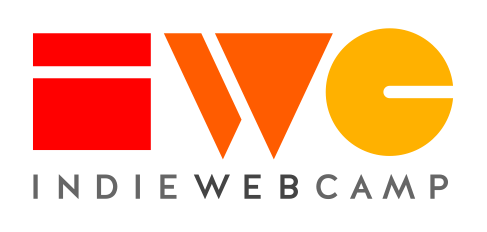Etherpad
This article is a stub. You can help the IndieWeb wiki by expanding it.
Etherpad is an open source, real-time, collaborative document editing tool that the IndieWebCamp community often uses to take notes during IndieWebCamps at https://etherpad.indieweb.org/.
- Warning: placing emoji into an etherpad will cause it to crash and not save your notes
Accessibility
- Quick note for screen reader users: For the best experience, use the latest version of FireFox and NVDA to access the Etherpad document. Use Alt-F9 to access the toolbar, and continue tabbing until you enter the main editing window, then use the NVDA+Spacebar shortcut to enter focus mode. To exit focus mode, use the Alt-F9 again to return to the toolbar and use the NVDA+Spacebar to exit focus mode.
- Colors: Some have noted that the color choices that etherpad makes for highlighting and differentiating different people's notes are not the most accessible. To remedy this, one can go to the Settings/Gear icon in the top right corner and uncheck the setting "Authorship colours" to get a higher contrast white/black view. There is also an option to double click one's highlight color to make it something with better contrast, but this doesn't fix the issue with the colors chosen by others making notes.
How to take notes during IndieWebCamp
- During session scheduling, each session should have a hashtag. Use that hashtag to add a link to the session grid, following the format: https://etherpad.indieweb.org/hashtag
- Open the link to that session's etherpad.
- If the etherpad has not been used before, copy/paste the template below to start it.
- Otherwise, if the etherpad has been used before, leave archived notes of previous sessions, enter a few blank lines at the top, then copy/paste the template.
- Fill in the IndieWebCamp city, year, session name, session time, and participants names/URLs. Note the session facilitator beside their name.
- Start taking notes collaboratively under the "Notes" heading.
- Use * for bulleted lists
- Use # for numbered lists
- Avoid indenting for nested lists, instead use multiple, e.g. ** is a second-level bullet
Etherpad Template
IndieWebCamp CITY YEAR
Session: SESSION_NAME
When: START_DATE_AND_TIME
== Participants ==
* [URL NAME] (session facilitator)
* {{addyourself}} or [URL NAME]
== Notes ==
* ...add notes
[[Category: YEAR sessions]]
[[Category: IndieWebCamp CITY YEAR]]
<!-- add other categories as appropriate -->
== See Also ==
* [[YEAR/CITY/Schedule]]
<!-- Add relevant wiki pages discussed here -->
----
Please note that all contributions to this pad and other IndieWebCamp documents are considered to be released under the public domain according to CC0.
Archiving IndieWebCamp / IndieWeb meetup notes
Using Cali
Cali is an IRC bot that lets you automatically archive meetup notes.
To use Cali, run the following command in the community chat:
!archive https://events.indieweb.org/event/page/url/ events/event-name
https://events.indieweb.org/event/page/url/should be the URL of the IndieWeb events page. This page must link to the Etherpad for the archiving tool to work.events/event-namethe slug use for the new wiki page.
After running the command, the Etherpad notes for the meetup will be saved to the wiki.
Cali will prompt you to review the formatting of the new wiki page. This is essential as Etherpads vary in their format and do not always correspond to the markup used on the wiki.
Cali does not add all metadata that one may want to document in the archived wiki format. The "manual" section below describes additional metadata you may want to add to the final wiki entry.
Manual
At the end of an IndieWebCamp, the notes will be moved from their etherpads to their respective session’s wiki page. This means moving the contents verbatim and leaving a link to the wiki behind for future visitors. The wiki page should also include a link to the original etherpad. The wiki pages can then be elaborated on and edited to fit the style of the wiki instead of freehand notes.
- Add a one-line dfn naming the session and linking to the IndieWebCamp event page.
- For example:
'''<dfn>SESSION_NAME</dfn>''' was a session at [[YEAR/CITY|IndieWebCamp CITY YEAR]]. - This first sentence will appear in the this-week newsletter.
- For example:
- Add the etherpad URL:
Notes archived from: [ETHERPAD_URL] - If video is available, add a link to it:
Video: {{videoduration|link=https://video.example.com/|duration=12:59}} - Categorize the page by including
[[Category: IndieWebCamp CITY YEAR]]and[[Category: YEAR sessions]], replacing the city and year.
The following snippet can be put on the etherpad after moving its contents:
---- IndieWebCamp CITY YEAR Session: SESSION_NAME When: START_DATE_AND_TIME Archived to: https://indieweb.org/YEAR/CITY/TAG ----
The tag for a session can be found on the IndieWebCamp’s schedule page.
An example of a session wiki page and etherpad after archiving: 2017/Bellingham/why
| Organizing Links | |
|---|---|
| General Tools | web chat • online chat clients • Events Calendar • Etherpad • remote participation • Zoom |
| IndieWebCamp | Planning • Organizing • Ticketing • Pop-up Organizing • Volunteer • What to expect at camp • Sponsor • IndieWebCamp kit • session facilitating • hallway track • photography policy |
| Categories | Organizing • Events • Camp Schedules • Camp Sessions • Organizer Meetups • Demos |
| Homebrew Website Club | Regular Meetings • How to Organize • Suggested Agenda • Online Format • Virtual HWC • Upcoming HWCs |
| Contributing to the wiki | MediaWiki: how to edit this wiki • wikifying • relevant • definition • start a page • expand a page • features we use |
